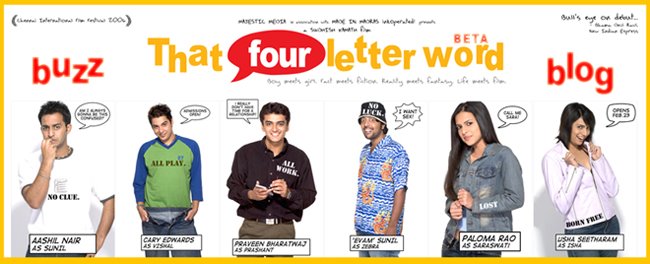I was talking to one of my friends about how people perceive a film like That Four Letter Word.
Some end up reviewing it like it's another mainstream movie or a Hollywood romantic comedy in the theatres. And, some take it so seriously and take it up as their subject of critique.
But thankfully, there have also been many who have seen it for what it really is.
Paintings and posters should never be compared by the same set of parameters.
Posters are designed for a purpose. To deliver a message to a mass. There's a certain amount of slickness in production, boldface screamers, simple smart copy and colourful visuals with instant appeal, tailored to deliver the communication to a mass audience. Or, like most commercial cinema, it aims at giving you pleasure for the money you've paid. But being a whore filmmaker needs a certain amount of shamelessness.
Paintings, however, are just an expression of the artist. Almost like an extension of his thought-process and imagination. Or, like most art cinema, it aims at giving the creator all the pleasure. But, we all know that wankers do it only because they got no takers. So, Is TFLW a poster or a painting?
Neither. As a beginner, I do not have the skills required for a painting. And with my limited resources, I cannot afford the production values a poster requires.
So what is TFLW? The independent film That Four Letter Word, at best, works as a scrapbook.
A scrapbook that's personal, random and straight from the heart. It has these sketches of characters, especially, those you would instantly identify among your friends. It tells you only as much as you need to know, as much as any comic book would tell you about its heroes. It does not say one of these characters is you. It only hints that you could be any of them or all of them at different points in your life. Each character epitomises and personifies one way to live your life.
That sort of generalisation was needed so that we could face off one approach with another. It is this generalisation that has worked with the lowest common denominator among the youth. And it is this generalisation that has made a coupla inexperienced critics call the film 'shallow'.
At another level, this is a film on male bonding. And it is not about the girls and their lives.
The girls are just sub-plots and their role in the film is limited to their impact on the lives of the four central characters (Which is why all posters and publicity have more of the guys and less of the girls). The girls' approach to life and backstory is explained in the comic book right at the beginning of the film. That's all you need to know about them.
In fact, a lot of women have been able to identify with the way the guys live their lives. Because, like Vishal, they sometimes wear their heart on the sleeve. Like Prashant, sometimes they have a head on their shoulder. Like Sunil, they have been confused. Like Zebra, they have sought escape through alcohol.
Like I explained to someone in the comments section of the 'Nishabd' review, we can only judge the depth or shallowness of a script depending on what the filmmaker is trying to say. If Varma wants us to understand the love story between a 60 year old man and 18 year old girl, he needs to show and tell us more than shaved legs.
He needs to give us a glimpse into the conversations that led to the unusual attraction. So what am I trying to say in my film? The only point I'm making through the film That Four Letter Word is that different people have different approaches towards chasing their dreams.
We do not pass value judgements on whether you should be Vishal and listen to your heart all the time or that you should be Prashant and use your head all the time. We are just telling you that even if you are as confused as Sunil is in the film or as escapist as Zebra in the film, life has its ways of bringing you solutions.
All TFLW says, like Sunil often says in the film, is that God is just the scriptwriter. It is upto each one of us to do what we want with that script. We have to direct that script the way we want to do it. It is up to us whether we want to keep the sad scenes short or indulge in the fun scenes for a little longer. No matter how we direct that scene, we have no control over the new twist that the next morning brings with it. So if you are like Vishal, you might still end up becoming Prashant and if you are Prashant, you might end up becoming Vishal.
Watch the film with this perspective and you'll know what I mean. We don't have the answers. Life has them.
That Four Letter Word is about the people we know so very well. Ourselves.
Since the film is just a scrapbook intended to trigger memories of your days at the crossroads of life, I urge the bitter critics of the film to tell me what they think is missing from what they ought to know.
Because, honestly, that would really help me while scripting my next film, something that I have been doing off late. As I do that, I'm tempted to design a "poster".
Subscribe to:
Post Comments (Atom)


No comments:
Post a Comment